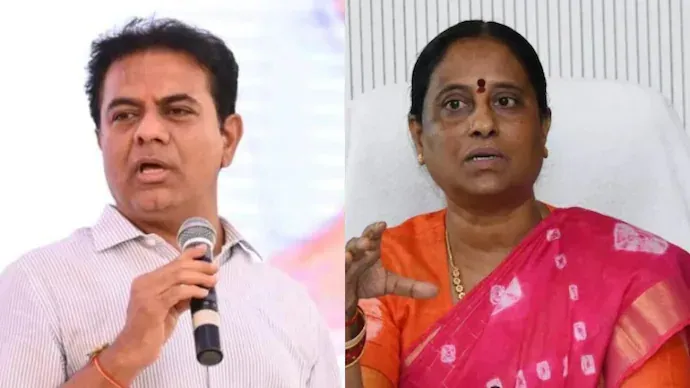
Date: October 25, 2024
KTR’s Defamation Case Against Konda Surekha
KTR’s Defamation Case: A Strong Legal Response to Konda Surekha
K.T. Rama Rao (KTR), a prominent leader in the Bharat Rashtra Samithi (BRS), recently took a decisive legal step against Konda Surekha, following defamatory accusations. Surekha’s remarks, which she made during a political debate, involved unsubstantiated claims that linked KTR to a controversial matter. The legal response from KTR included a high-stakes Rs 100 crore defamation suit. This case has highlighted the growing concern over accountability in public statements, especially among political figures.
Court Orders Immediate Removal of Defamatory Content
During the hearing, the court made it clear that Konda Surekha had crossed a line. Her remarks, which spread rapidly across social and mainstream media, were deemed damaging and baseless. The judge not only criticized her statements but also issued a legal injunction. This order prohibits Surekha from making further derogatory comments about KTR. To curb the spread of the defamatory content, the court directed major online platforms, including YouTube, Google, and Meta (formerly Facebook), to remove all related posts, videos, and articles.
Impact on Social Media and Content Accountability
This ruling carries significant weight, as it sets a precedent for how defamatory content must be managed on social platforms. Surekha’s statements had circulated widely, and the court’s decision places responsibility on social media companies to address such content swiftly. The court’s directive reinforces the importance of responsible communication in political dialogue, as misinformation can quickly influence public perception.
The Significance of KTR’s Rs 100 Crore Defamation Claim on Konda Surekha
KTR’s decision to file for Rs 100 crore reflects his commitment to safeguarding his reputation. In today’s digital world, political leaders are increasingly turning to defamation suits to address false statements that could harm their image. For KTR, this case isn’t only about his reputation but about setting a strong example. By pursuing this case aggressively, KTR aims to deter other public figures from using false claims to create political narratives.
Public Figures and the Importance of Responsible Communication
This case brings up a broader question about accountability in politics. Politicians often wield influence over public opinion, and when they make statements, those words hold weight. The court’s action against Surekha sends a message that using unverified claims to defame others is unacceptable. It encourages public figures to consider the impact of their words before making damaging statements about others, especially in the political arena.
Legal Precedent and Its Broader Implications
The legal outcome of KTR’s defamation suit holds implications beyond this case. The court’s ruling emphasizes the role of social media in amplifying content and the need for platforms to act against misinformation. This case could potentially influence future legal frameworks, especially as countries grapple with the challenges posed by digital communication. Laws surrounding defamation and misinformation may evolve further, as courts aim to protect individuals’ reputations while balancing free speech.
Konda Surekha Apology: A Step Toward Resolution?
While Surekha has since issued an apology to KTR, the lawsuit remains ongoing. Her apology acknowledges the damage her words may have caused, yet the legal proceedings are expected to continue. KTR’s legal team is prepared to take the case forward, underscoring that apologies alone might not be enough when reputation and public trust are at stake.
Conclusion: A Call for Responsible Public Discourse
The KTR-Surekha defamation case has ignited conversations about the responsibility of public figures in maintaining respectful and truthful communication. The case also demonstrates the power of the judiciary to address reckless defamation. As this case unfolds, it stands as a reminder for politicians and social influencers alike: responsible communication isn’t just ethical—it’s essential for maintaining public trust.